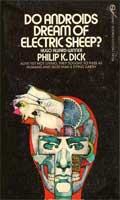Reviewed by celinenyx on
After World War Terminus, Earth is covered in radioactive dust, destroying the ecosystem. Most people have emigrated to the colony on Mars. Rick is one of those who stayed behind. He is a bounty hunter charged with killing androids that have escaped from Mars. After his superior hunter is hospitalized, it's up to him to "retire" a few dangerous and near-human androids.
I haven't read a lot of science-fiction, but the genre in general appeals to me in how it treats philosophical concepts. Do Androids Dream is a fantastic example of this. While the book could have easily been a action-packed novel with many fighting scenes and chasing androids across the galaxy, it's much more concerned with ideas. Though I'm slightly hesitant to use this label, but I think the book has many elements of literary fiction. It's incredibly layered and the easy-to-read plot keeps the book accessible.
Among other things, Do Androids Dream is concerned with identity, empathy, and ultimately, what makes us human. There is a dash of religion, but while it was inspired by Christianity to a limited extent, it's served with a big heap of post-modernity, making it much more palatable to my agnostic tastes. There is a lot going on in this book, but I never felt overwhelmed. Mr Dick writes in a clear, though sometimes surrealistic, style. The book isn't much concerned with futuristic tech, but some of the inventions made me chuckle.
Do Androids Dream of Electric Sheep? is a book that makes you think, something all good science-fiction does. I would love to reread this book with my academic-reader hat on, because there is still so much to discover. Would recommend it for readers who enjoyed Brave New World.
Reading updates
- Started reading
- 3 August, 2015: Finished reading
- 3 August, 2015: Reviewed
